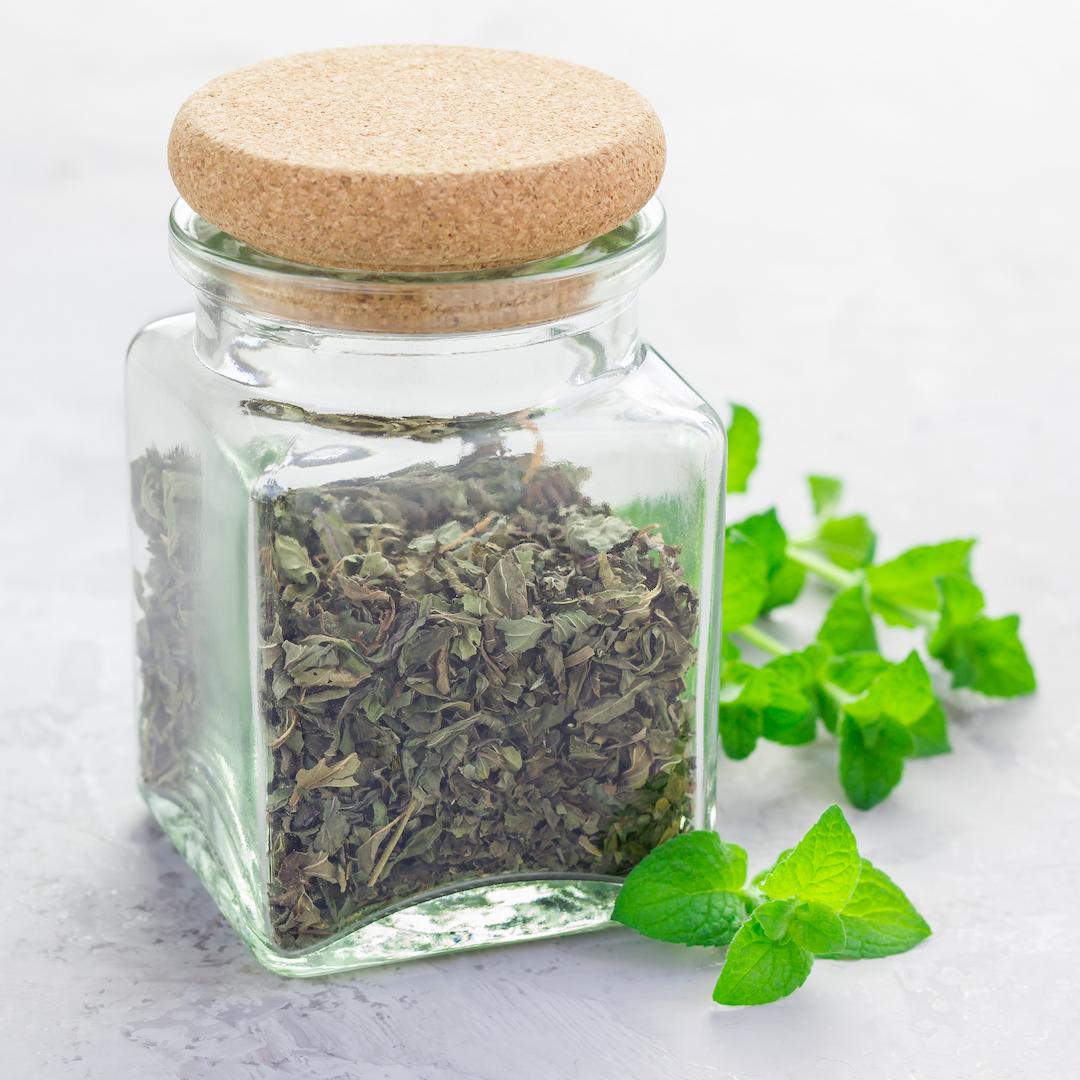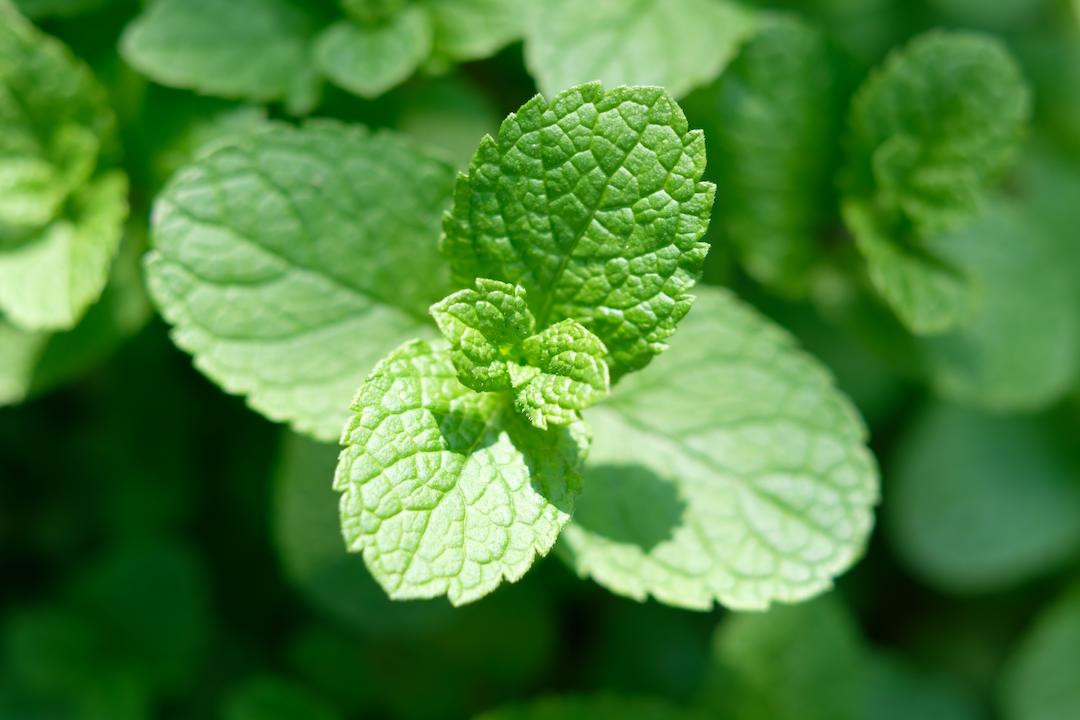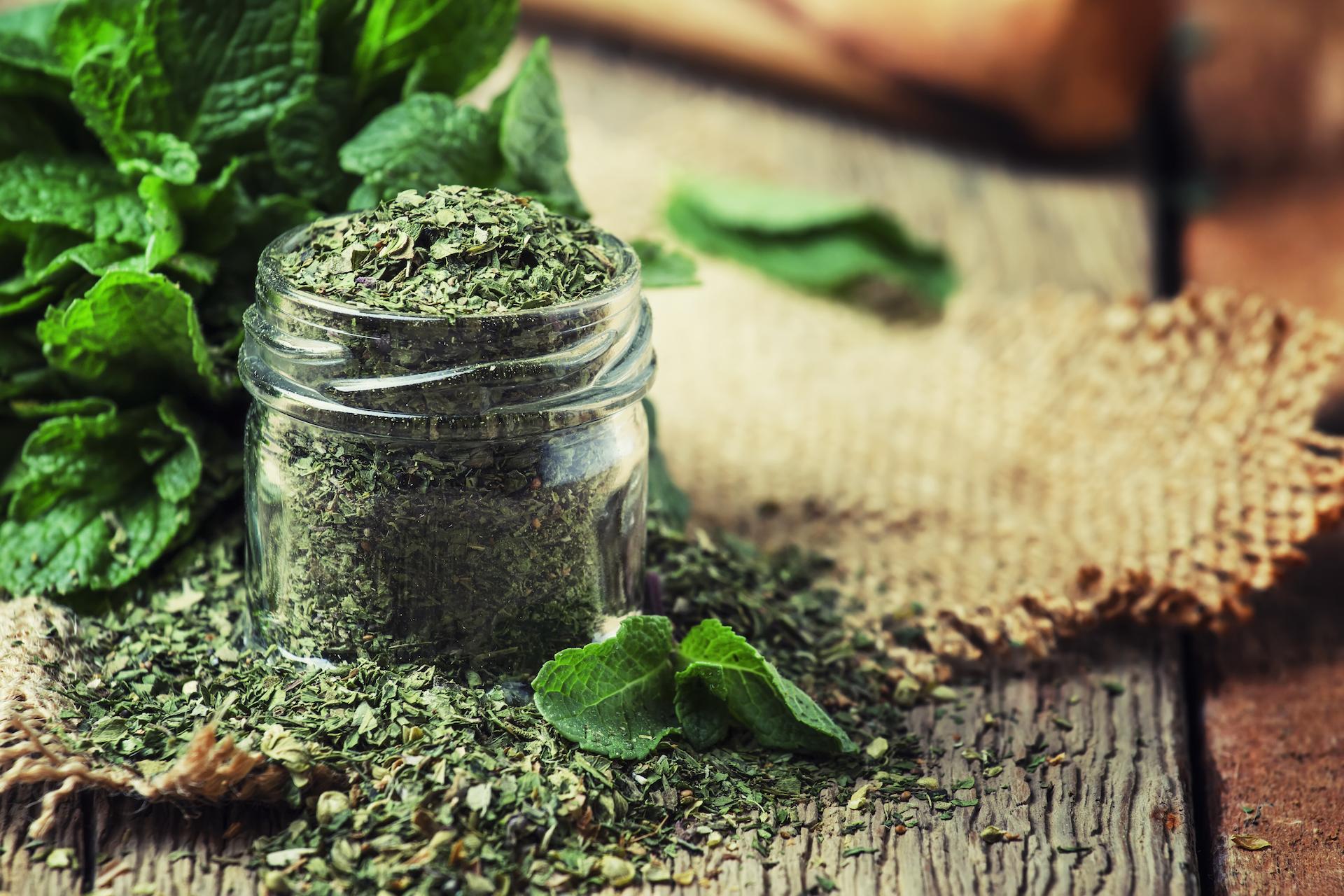The Health Benefits of Peppermint Tea
Posted by Elise Goldsworthy BHSc (Nutrition Science) on 17th Feb 2022
Peppermint tea is a celebration of everything bright, fresh and uplifting. It’s a vibrant and verdant cup of joy!
It imparts a cooling, invigorating taste and is a wonderful herbal tea. Peppermint tea on it’s own is a delight. It also pairs well in a blend, such as with green tea, raspberry leaf or even with a couple of fresh rosemary sprigs.
What’s even better, is that peppermint tea is great for your health. Enjoy it to help soothe an upset tummy, increase focus or relax your entire being!
Whether you’re enjoying a classic cup of peppermint tea, a refreshing iced peppermint tisane, or a bespoke blend, this little herb will be sure to brighten your day.
What is Peppermint Tea?
Peppermint is a herb that is native to Middle Eastern countries and Europe. Some very early uses were documented by the English in 1696. Its botanical name is Mentha Piperita from the Labiata species of herbs.
Peppermint tea is technically a tisane, made from mint leaves. It is also known as metha tea and has been popular in many cultures for centuries. Peppermint tea is naturally caffeine-free so it can be enjoyed at any time of the day. Peppermint is a natural digestive aid, and is perfect for after dinner. Peppermint tea has a robust and distinctive ‘minty’ flavour thanks to the high levels of menthol within the leaves.

What is Menthol?
Menthol is an aromatic chemical compound found in mint plants. One of the earliest documented recordings of menthol was from German chemist Heironymus Gaubius in 1771. Menthol is concentrated in the oils of peppermint leaves and is what gives peppermint tea a cooling minty flavour and aroma. Menthol has a myriad of applications in medicine, which have been used in herbal preparations and modern pharmaceuticals alike.
Peppermint Tea Cultivation
Peppermint leaves grow in moist, shady locations and in most climates. As a herb, mint grows rapidly and can cover the ground, throwing runners or shoots down into the surrounding soil. Anyone with mint growing in their herb garden knows how hardy it is as a plant. It can sometimes take over a garden bed if left to it’s minty devices. It’s best to keep peppermint contained in a pot in a semi-shaded spot to avoid excessive spreading.
Peppermint leaves that are ready for tea-making are harvested just as the flowering tops begin to open. Bright green and fragrant leaves that have been freshly picked make a wonderful peppermint tisane. The essential oil concentration is high in these leaves, making for a lovely, refreshing tea.
When choosing any tea, it’s important to select organically grown teas which haven’t been treated with pesticides. Pesticides can sometimes change the flavour of the tea. Like most teas, the strongest and best peppermint tea brew is made using fresh or dried mint leaves.

Health Benefits of Peppermint Tea
The natural oils in peppermint have historically been used to treat heartburn, nausea and irritable bowel conditions. Peppermint tea also has immune-boosting properties and can be used to treat muscular aches and pains, particularly related to the digestive system.
Peppermint tea has a few well known and a couple of lesser known health benefits. Peppermint tea is commonly used to help with:
- Digestion
- Reducing stress
- Muscle relaxant
- Immune support
- Improving mental focus
- Relieving pain
Read on for more on the benefits of peppermint tea.
Soothes Tummy Troubles & Improves Digestion
Peppermint tea has a calming and cooling effect, which naturally helps soothe upset tummies. The menthol in peppermint helps relax the abdominal muscles, and also has pain-relieving properties. This is particularly good with relieving abdominal cramping and discomfort.
Peppermint tea also helps stimulate the production of stomach acid, which can help with digestion. Stomach acid helps break down food and facilitates its passage through the digestive tract. When stomach acid is firing, it has downstream benefits to the rest of the digestive system. The liver and gallbladder is stimulated to produce bile and the small intestine is triggered to produce enzymes. This means there’s a reduced incidence of diarrhoea and constipation when peppermint tea is consumed regularly. A UK study also showed that peppermint tea helps relieve bloating, cramping and indigestion by reducing gas formation.
Freshens Your Breath
We know of the use of peppermint in toothpaste for this very reason. Bad breath (halitosis) can be an embarrassing problem that affects many people. In most cases, bad breath is caused by an imbalance of unhealthy bacteria in the mouth. The menthol in peppermint leaves have natural antimicrobial properties. So drinking peppermint tea could be an easy way to refresh your breath and address the potential underlying cause as well. Win-win!
Peppermint also helps bind and remove the compounds from food that cause a smelly breath, such as from garlic and onion. Be sure to enjoy a cup of peppermint tea, made from fresh or dried leaves, to get maximum fresh breath benefits.
Supports Immune Function
The very act of drinking a hot cup of tea is medicinal and has been practised in traditional cultures for aeons. Suffering from a sore throat or headache? Or simply just feel run-down and need a soothing sip to alleviate your symptoms? What could be more elegant and effective than a cup of tea?
Peppermint tea has immune-boosting compounds that both bolster your body and help ward off disease-causing bacteria. It’s a natural decongestant, helping clear mucous from the air passages. What’s more, the menthol in peppermint tea is a natural anti-spasmodic, which means it can relax muscles of the throat and larynx. This is of great relief when struggling with an irritated throat, annoying cough and feeling blocked up.
High in antioxidants, vitamin C, B vitamins and minerals, peppermint tea can aid in energy production and detoxification. Peppermint tea can help your body recover after getting sick, with these nutrients supporting your liver and energy levels.
Improves Mental Acuity and Focus
Research has shown that peppermint enhances memory and alertness. This finding published in the International Journal of Neuroscience is likely due to the strong aromatic compounds in peppermint. An area of the brain called the hippocampus, which is involved in emotion, memory and focus, is stimulated by the menthol compound in peppermint tea. Studies have demonstrated that when peppermint tea is consumed, participants report a feeling of wakefulness, increased concentration and focus.
Relaxes Body & Mind
Ayurvedic medicine has long used peppermint tea as a form of aromatherapy. It’s use in reducing stress, promoting relaxation and in enhancing a feeling of rejuvenation make it a popular tea in this and other ancient cultures. Peppermint tea is also caffeine-free, so unlike black or green tea, peppermint tea can be consumed day or night. Whenever you want to feel relaxed, easeful and yet calmly focused, peppermint tea is your go-to herbal tea.

When Should I Avoid Peppermint Tea?
If you suffer from heartburn, proceed with caution…
While peppermint tea is frequently used to treat mild nausea and stomach discomfort, it should be avoided if you have acid reflux. Reflux, heartburn, dyspepsia or GORD as it is sometimes known, all describe a condition affecting the stomach and oesophagus. This condition involves overactive stomach acid production, and/or a weak oesophageal sphincter. This means stomach acid can regurgitate into the oesophagus and sometimes may reach as high up as the throat. This causes a burning sensation and pain, and over time may continue to cause local tissue damage. Drinking peppermint tea can cause excessive relaxation of the oesophagus, which can exacerbate existing reflux symptoms. If you have any concerns, consult your trusted health provider.
How To Brew The Best Peppermint Tea
Here’s how to brew the most refreshing, lively cup of peppermint tea in 3 simple steps.
Prepare Your Peppermint Tea Leaves
Grab your tea infuser if you’re using loose leaf teas. For tea bags, simply pop a bag in your favourite mug. Get excited for a minty refreshing cup of tea!
Boil Water, Then Wait A Sec
Because peppermint tea is a herbal tea, it needs a gentler treatment to preserve its delicate flavour and aroma. Hot water (80-90 degrees celsius), rather than boiling water is ideal. Once the water is boiled from the kettle or stove, wait a couple of minutes before pouring over your tea leaves.
Steep Your Tea
Peppermint tea gets stronger in taste and more aromatic the longer it steeps. Allow between 5 and 10 minutes for optimal flavour and also to obtain the best health benefits.
If using loose tea leaves, cover your mug or keep the lid on your infuser/teapot to allow all the minty notes to develop. If using a tea bag, just leave the bag in as long as desired and enjoy your relaxing cup of peppermint tea!
References
Ahmad, N., Fazal, H., Ahmad, I., & Abbasi, B. H. (2012). Free radical scavenging (DPPH) potential in nine Mentha species. Toxicology and industrial health, 28(1), 83–89. https://doi.org/10.1177/0748233711407238
Kennedy D. O. (2019). Phytochemicals for Improving Aspects of Cognitive Function and Psychological State Potentially Relevant to Sports Performance. Sports medicine (Auckland, N.Z.), 49(Suppl 1), 39–58. https://doi.org/10.1007/s40279-018-1007-0
McKay, D. L., & Blumberg, J. B. (2006). A review of the bioactivity and potential health benefits of peppermint tea (Mentha piperita L.). Phytotherapy research : PTR, 20(8), 619–633. https://doi.org/10.1002/ptr.1936
Moss, M., Hewitt, S., Moss, L., & Wesnes, K. (2008). Modulation of cognitive performance and mood by aromas of peppermint and ylang-ylang. The International journal of neuroscience, 118(1), 59–77. https://doi.org/10.1080/00207450601042094
Thompson Coon, J., & Ernst, E. (2002). Systematic review: herbal medicinal products for non-ulcer dyspepsia. Alimentary pharmacology & therapeutics, 16(10), 1689–1699. https://doi.org/10.1046/j.1365-2036.2002.01339.x
Vázquez-Fresno, R., Rosana, A., Sajed, T., Onookome-Okome, T., Wishart, N. A., & Wishart, D. S. (2019). Herbs and Spices- Biomarkers of Intake Based on Human Intervention Studies - A Systematic Review. Genes & nutrition, 14, 18. https://doi.org/10.1186/s12263-019-0636-8
Wikipedia Contributors. (2022, February 10). Peppermint. Retrieved from Wikipedia website:
https://en.wikipedia.org/wiki/Peppermint#Research_and_health_effects, viewed 10 February 2022
